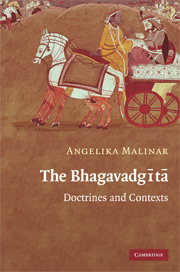Book contents
- Frontmatter
- Contents
- Acknowledgements
- List of abbreviations
- Introduction
- 1 The Bhagavadgītā in the history of research
- 2 Debates over war and peace in the Udyogaparvan of the Mahābhārata
- 3 The doctrines of the Bhagavadgītā
- 4 The doctrines of the Bhagavadgītā: summary and systematic considerations
- 5 Historical and cultural contexts
- Bibliography
- Index
3 - The doctrines of the Bhagavadgītā
Published online by Cambridge University Press: 06 January 2010
- Frontmatter
- Contents
- Acknowledgements
- List of abbreviations
- Introduction
- 1 The Bhagavadgītā in the history of research
- 2 Debates over war and peace in the Udyogaparvan of the Mahābhārata
- 3 The doctrines of the Bhagavadgītā
- 4 The doctrines of the Bhagavadgītā: summary and systematic considerations
- 5 Historical and cultural contexts
- Bibliography
- Index
Summary
The following chapter-by-chapter analysis of the BhG is based on the heuristic assumption that the epic is regarded as a literary and discursive framework that opens up new perspectives for the interpretation of the text. In order to do this, it is not necessary to take sides with either the text-critical or the ‘unitarian’ approach, as has been the case in much of the history of research on the BhG. In what follows I will explore the connections between the BhG and the epic in detail without denying its textual history. On the contrary, the historical perspective helps to interpret the extant text, the BhG's final redaction. Therefore, text-historical considerations will be included in the analysis of the text. As has been pointed out before, scholars are divided about whether the theistic layers or the non-theistic Sāṃkhya and yoga layers blended with notions of sacrifice form the original core of the BhG. In what follows, it will be suggested that the monotheistic framework in which Kṛṣṇa is proclaimed the highest god draws on concepts developed in the non-theistic chapters. These chapters are also characterised by theistic interpolations that in their turn are based on the later chapters and have been inserted into the earlier texts. However, this did not result in a consequent reworking of the whole argument along Kṛṣṇaitic lines.
- Type
- Chapter
- Information
- The BhagavadgitaDoctrines and Contexts, pp. 54 - 225Publisher: Cambridge University PressPrint publication year: 2007



